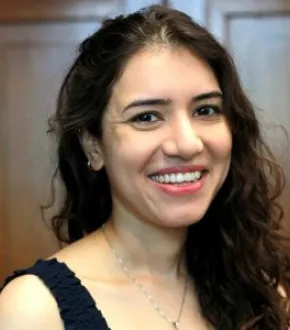Anushé Hassan, PhD

Anushé Hassan is a research fellow at the European Research University. She completed her PhD at LSHTM in 2021, at the Department of Population Health, funded by the Economic and Social Research Council. Since 2020, she has worked as research fellow at LSHTM, particularly on two projects: The Evolutionary Demography of Religion project and the DREAMS Intervention Evaluation. Her research has been interdisciplinary and draws on theory and methods from anthropology, human behavioural ecology and demography. She is motivated by research that promotes the well-being of girls and women, has expertise in qualitative and quantitative data collection, and has a strong open science ethos. She aims for her research to be non-extractive and co-produced with collaborators and communities in study countries. Currently, her research topics include fertility, religion, women's autonomy and empowerment, social support networks, and women and children's wellbeing. She is particularly interested in cross-cultural variation in women's support networks, including but not limited to support for childcare, and the importance of these networks for women and their family's physical, mental and emotional wellbeing. Increasingly, she is keen to explore the impact of disasters such as flooding on women's autonomy and empowerment, and whether support networks help in navigating these disasters.
Qualification.
PhD
London School of Hygiene and Tropical Medicine, University of London, Epidemiology and Population Health, 2020
Master´s Degree
London School of Hygiene and Tropical Medicine, University of London, Demography and Health, 2015
Bachelor´s Degree
University College London, University of London, Anthropology, 2012
Experience.
2025–present, ERUNI, Research Fellow (part-time)
2020–present, London School of Hygiene and Tropical Medicine, University of London, Research Fellow
2012–2014, Population Council (Pakistan), Research Officer
2012–2014, Froebel's International School, IGCSE History Teacher
Publications (last 5 years, selected).
SHAVER, J. H., CHVAJA, R., SPAKE, L., HASSAN, A., BADJIE, J., PRENTICE, A. M., CERAMI, C., SEAR, R., SHENK, M. K., SOSIS, R. Religious Involvement Is Associated With Higher Fertility and Lower Maternal Investment, but More Alloparental Support Among Gambian Mothers. American Journal of Human Biology. 2024, 26(12). https://doi.org/10.1002/ajhb.24144.
SPAKE L., HASSAN A., SCHAFFNIT S. B., ALAM N., AMOAH A. S., BADJIE J., CERAMI C., CRAMPIN A., DUBE A., KAYE M. P., KOTCH R., LIEW F., MCLEAN E., MUNTHALI-MKANDAWIRE S., MWALWANDA L., PETERSEN A.-C., PRENTICE A. M., ZOHORA F. t., WATTS J., SEAR R., SHENK M. K., SOSIS R., SHAVER J. H. 2024. A practical guide to cross-cultural and multi-sited data collection in the biological and behavioural sciences. 2024. Proceedings of the Royal Society B: Biological Sciences. 2024, 291(2021). https://doi.org/10.1098/rspb.2023.1422.
PAGE A. E., MIGLIANO A. B., DYBLE M., MAJOR-SMITH D., VIGUIER S., HASSAN A. Sedentarization and maternal childcare networks: role of risk, gender and demography. Philosophical Transactions of the Royal Society B: Biological Sciences. 2023, 378(1868). http://doi.org/10.1098/rstb.2021.0435.
SPAKE, L., HASSAN, A., SEAR, R., SHENK, M. K., SOSIS, R., SHAVER, J. H. Disentangling the relationships between religion and fertility. Religion, Brain & Behavior. 2022, 12(4), 343–346. https://doi.org/10.1080/2153599X.2022.2127212.
LAWSON, D. W., SCHAFFNIT, S. B., HASSAN, A., URASSA, M. Shared interests or sexual conflict? Spousal age gap, women's wellbeing and fertility in rural Tanzania, Evolution and Human Behavior. 2021, 42(2), p. 165-175. https://doi.org/10.1016/j.evolhumbehav.2020.08.009.
Hobbies.
Travelling